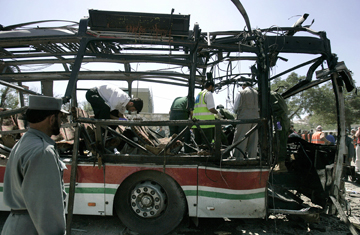
An Afghan police officer secures the area as investigators search for evidence inside the wreckege of a police bus at the site of a bomb blast in Kabul, 17 June 2007
A bomb tore through a police academy bus in central Kabul this morning, in another disturbing reflection in Afghanistan of the early insurgent activities that eventually threw Iraq into bloody instability. The attack appears to have expressly targeted Afghanistan's fledgling police force, killing 35 police instructors, police officers and civilians and wounding more than 50, including two Japanese civilians and one Korean. The attack is the worst Kabul has seen since the fall of the Taliban in 2001.
Afghan police have long been perceived to be ineffectual and corrupt, but over the past few years intensive police training programs have started to bear fruit. Slowly the force is gaining respect among Afghans. A planned ceremony marking the handover of the program from the Germans to an international training force was to take place later today. With Afghan police increasingly becoming the target of insurgent attacks, this morning's blast highlights just how difficult rebuilding this countrys fractured government institutions will be.
Every morning police academy vehicles park at the public bus stand in front of Police Chief Headquarters, waiting to ferry police trainers and students to the academy about three miles away. The blast, which could be heard at least a mile away, was detonated by a suicide bomber. Investigators say the bomber was pretending to be a beggar, and tried to get on the bus to collect alms from the passengers, a common practice on public transport. When the police stopped him from mounting the steps, he detonated the bomb, which appears to have been packed with ball bearings. The force of the explosion was enough to peel the roof of the bus off and hurl it 10 meters [30 feet] away. General Ali Shah Paktiawaal, head of Kabul's Criminal Investigation Department, had just pulled up to the gate when he felt his bulletproof car leap in the air from the force of the blast. "I thought it was a landmine," he said. The rose garden at police headquarters, protected from the street by a thick, eight-foot wall, was littered with broken glass, charred metal and body parts. "They were recognizable as human," says day laborer Abdul Moman, who was working in the garden, "but we couldnt identify what parts they were."
Sharifullah Nazimi, a 20 year-old police officer at the site of the explosion, says two of his uncles were on the bus. One was wounded. He hasn't heard about the other. "You know the police provide security for Afghans," he says. "And the enemies of Afghanistan want to destroy our peace and our country. That's why they are targeting our police. They don't attack Americans or Coalition forces, only Afghans."
Within two hours of the attack Taliban spokesman Qari Yusuf Ahmadi claimed responsibility, identifying a 25-year-old Kabul resident named Hasim as the bomber. "This is part of our ongoing ambush operations," he said. "The more we kill foreigners and Americans, the more we will kill Afghan forces who are working as their slaves." Ahmadi was making a reference as well to a suicide car attack on Saturday on a NATO convoy that killed four and wounded five. General Paktiawaal, watching the announcement on the TV in his office, looked harassed and angry. "This is a terrorist attack," he said. "We can try to prevent suicide bombers, but it's difficult." Despite this sudden surge in violence, Paktiawaal denies that he is worried. "The terrorists are doing their job, and we will continue to do ours."
